Denis Villeneuve Goes Film-by-Film, from ‘Incendies’ to ‘Dune’
As you’ve undoubtedly already heard, Film Independent Presents kicked off its latest series of big-name events at the Wallis Annenberg Center for the Performing Arts on Tuesday, November 9–when a packed house was on hand for a very special “An Evening with…” featuring director Denis Villeneuve.
The French-Canadian filmmaker’s latest project is already a hot contender for awards season with Warner Bros’ $165 million epic sci-fi drama Dune, starring Timotheé Chalamet, Zendaya and other A-list heavyweights including Josh Brolin, Stellan Skarsgård, Charlotte Rampling, Javier Bardem and Jason Momoa. After 35 days of theatrical release, the film has just crossed the $370 million mark at the worldwide box office (including $100 million domestically) and has been green-lit for a sequel.
Moderated by KPCC’s “The Frame” host John Horn, the evening began with an intimate reception in The Wallis Wells Family Education Courtyard before almost every seat in the Bram Goldsmith Theater was filled and the main event got underway.
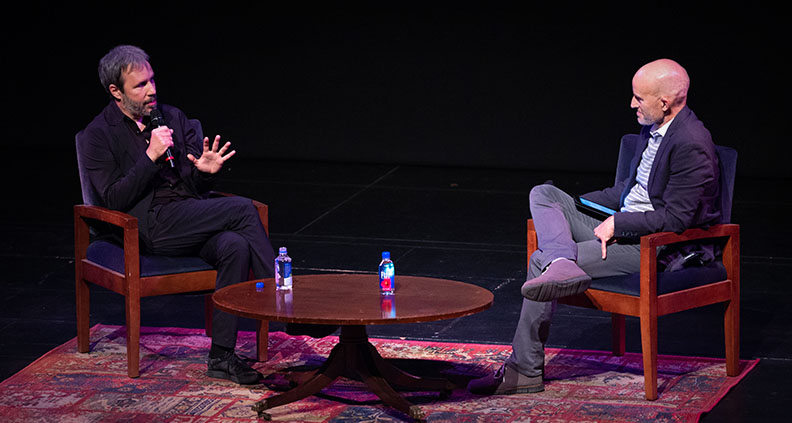
Villeneuve first garnered international attention with Canadian psychological drama Maelström (2000) and then again with Polytechnique (2009), based on the real-life anti-feminist mass shooting known as the “Montreal Massacre” in 1989.
Throughout his career–from Incendies (2010) to Blade Runner 2049 (2017) and now Dune–Villeneuve has remained steadfastly loyal to the independent filmmaking frame of mind. As Horn aptly notes, Villeneuve’s work is never about budget or technology but rather the essence of storytelling. His career loyalty, Horn suggested, is to story–not to the studios paying to make his movies. Said the director: “My loyalty is to cinema. I have a sacred relationship with cinema; it is like a kind of religion.”
Whether a big-budget Hollywood film or a documentary shot on a shoestring budget, the Quebecois director says he has to find a deep inner connection to the material, which informs every decision he makes on a film.
“There’s nothing more moving for me than to be with a film crew in the mud, in the cold, feeling the energy and passion of the crew, trying to inspire them. At the end of the day, that’s the most important part of cinema.” Villeneuve also admitted to being very stubborn in adhering to his creative vision on every project: “For me, movies is like war and there are some battles that I know I would not lose.”
Family as an anchor to reality, and his work

Several of the film clips featured in tonight’s discussion–Incendies, Arrival (2016) and certainly Dune–have one strong through-line in common: family. And more specifically, the complex relationship between parents and their children. Even though Villeneuve is often away from his family for extended periods of time while filming on location, he credits his children for inspiring his craft: “I think I can make movies because I have kids. They are the ones who gave me an anchor into reality and showed me how I have changed throughout the years. Humans have the ability to evolve and change the course of things in life, and this gives me hope for humanity.”
Why he works on the first cut without temp score
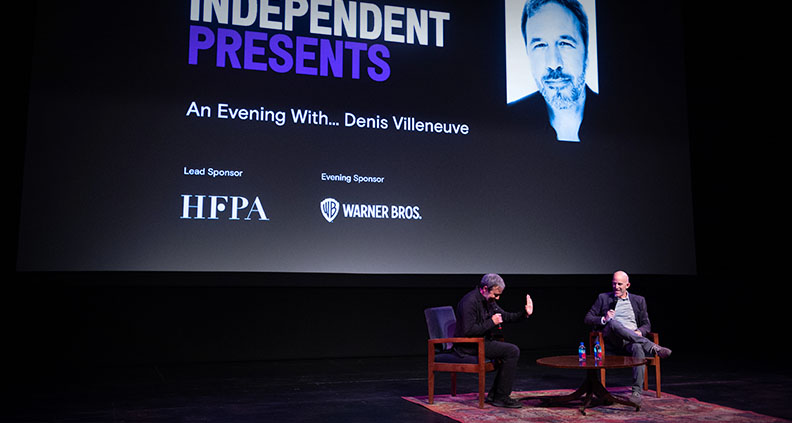
Even though music affects Villeneuve very intensely–which is why he seldom listens to music casually–he prefers to edit the first cut of his films without temp score. He does so to ensure that there is as much tension as possible before a film is embellished with the emotions that music engenders, but also, more importantly, to detect any areas in the story that needs more work. “Everything with music looks beautiful. When there is too much music, I feel it is a way to mask the weaknesses of the story. If you remove the music, then you can see where the movie needs love, where you need to spend more time. When I feel the movie is alive without music, then I know it works.”
Incendies: Finding peace by freeing oneself from one’s heritage
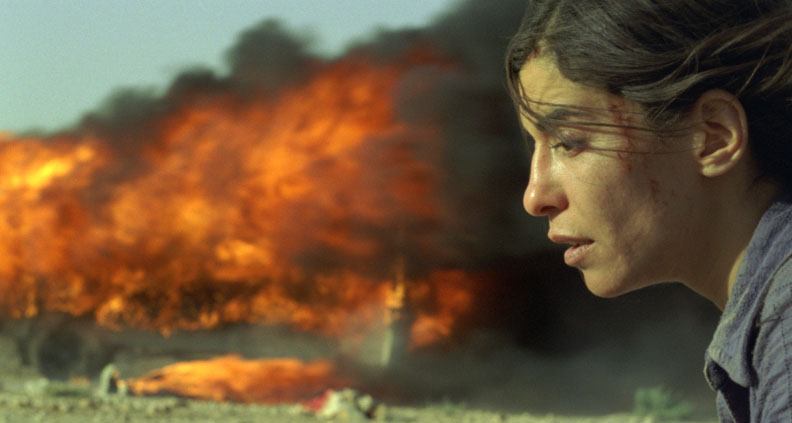
Villeneuve’s first Oscar-nominated film (and winner of eight Canadian Genie Awards in 2011) came after a nine-year self-imposed filmmaking hiatus. He had become disillusioned after making his second feature, feeling like he wasn’t making films or directing actors the way that he thought he should. “I felt like I was making cinema more for my own reasons, instead of using cinema to learn or give something to society.” So he decided to simply stop until the day he heard, read or saw something that inspired him enough to once again pick up the camera. During this break, Villeneuve went back to school and re-emerged invigorated with his craft.
Fortunately, the world did not have to wait too long for Villeneuve’s next masterpiece. The inspiration came in the form of a three-hour-and-45-minute play by Lebanese-Canadian playwright Wajdi Mouawad entitled Incendies–an emotional family drama surrounding the Lebanese Civil War. The play affected Villeneuve so profoundly that he immediately secured the film rights after watching the searing performance. “At the end of the play, there was no more oxygen in the room. It was the most powerful artistic event I’ve witnessed in my life.” The play struck a chord with him because it spoke deeply “about my own identity, the weight of the family, the voices of the past and the weight of heritage, and how to be free of that heritage,” he said, adding: “At that time, I was very obsessed with those questions.”
Arrival: People can build bridges
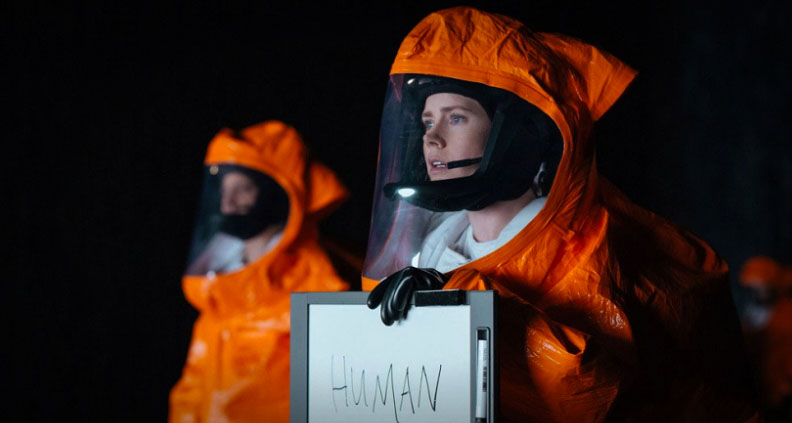
Nominated for eight Academy Awards (with a win for Sound Editing), the deeply cerebral sci-fi drama Arrival acquired a deeper thematic significance when it was released one week after the November 2016 US Presidential election. At a time when the national dialogue was ever more polarized when it came to the issue of immigration, the film–about a linguistic professor’s (Amy Adams) thoughtful approach to finding a way to communicate with the cephalopod-like, seven-limbed extraterrestrial aliens landing on Earth–showed us the value of talking to our enemies: it is possible to talk to people, even when you literally don’t speak the same language.
“Not just enemies but also foreigners and foreign cultures, we can find ways to build bridges to cross that stream, [that] barrier. That is what I found deeply inspiring about that story,” Villeneuve said. He also emphasized the idea of cinema as a tool in building emotional bridges across cultures. “As filmmakers, we have a responsibility to address the fear of ‘The Other.’ Cinema is a beautiful tool for that.”
Dune: Expanding on the ‘seeds of feminism’ in the novel
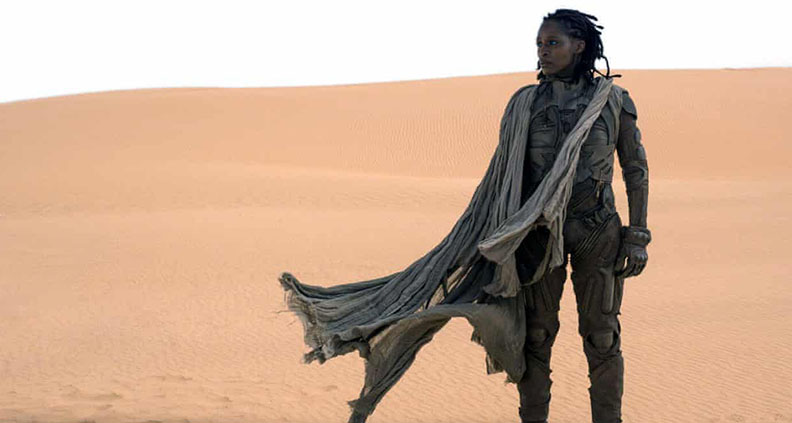
When it came to tackling the remake of the 1984 David Lynch film and adapting Frank Herbert’s novel, Villeneuve was well aware of the risks of taking on such a beloved material. “When you adapt, you destroy. But there’s a way to do it so that you can keep the spirit of the original alive.” He recalls how impressed he was with Peter Jackson’s Lord of the Rings–particularly with how faithful the director remained to the books–and tried to follow the same path when it was his turn to adapt the works of a science fiction literary giant.
Remaining faithful to core Dune fans and yet not being exclusionary to neophytes was the ultimate challenge in pulling off the project, he admits. Villeneuve still recalls the first time he read Herbert’s novel: “When I read the book at 13, it was a very visceral reading for me. I really tried to reconnect to that first reading–the purity and uncorrupted images and the emotions– before I saw any of the other adaptations.” He specifically asked his crew not to research images online so as to bring the essence of Herbert’s singular vision to the screen.
To make it more relevant for the contemporary audience, Villeneuve further expanded the feminist elements of the novel by making some of the female characters more prominent in the film and even switching the gender of one key character. “I have always been interested in femininity and the relationship between women and power, and most of my movies reflect that. Why? Because I was raised by a feminist mother and a very powerful grandmother. What struck me when I read the book, which is a very masculine-driven story, was there were seeds of feminism, and we brought that more to the surface in the film.”
More Film Independent at the Wallis…
- Maggie Gyllenhaal career retrospective
- Alexandre Desplat live performance
- Denis Villeneuve Dune deep-dive
Denis Villeneuve at the 2017 Film Independent Directors Close-Up discussing the making of Arrival:
Film Independent Presents is supported year-round by Lead Sponsor the Hollywood Foreign Press Association. Additional support for these special events at The Wallis provided by Warner Bros., Searchlight Pictures, Netflix, Apple Original Films and Lionsgate.
Film Independent promotes unique independent voices by helping filmmakers create and advance new work. To become a Member of Film Independent, just click here. To support us with a donation, click here.
